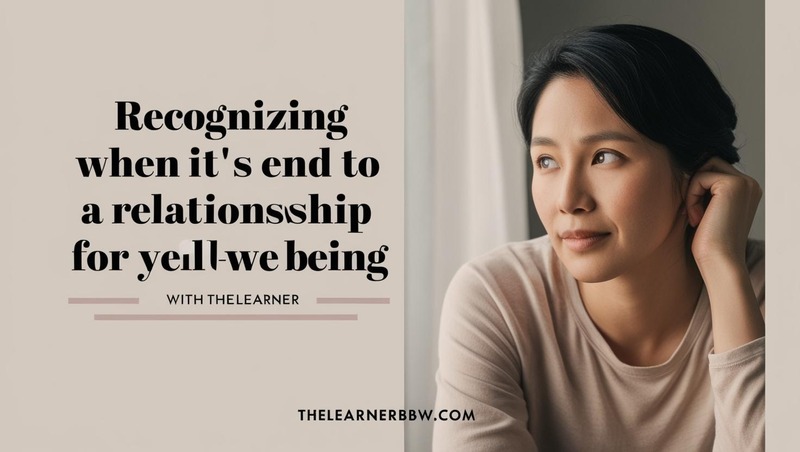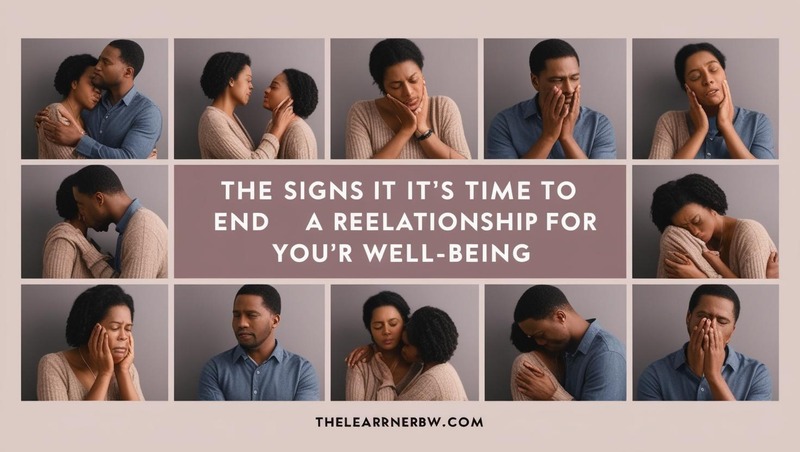Recognizing when it’s time to end a relationship for your well-being is a critical step toward maintaining your emotional health and personal growth. While every relationship goes through ups and downs, there are certain signs that can indicate when it’s no longer serving your best interests. Here are expert insights on how to recognize when it’s time to let go:

1. Consistent Unhappiness
If you find yourself feeling more unhappy than happy in the relationship over a prolonged period, this is a key sign that things are not working. Everyone has bad days but if your general emotional state is marked by stress, sadness, frustration, or anxiety because of the relationship, it’s worth considering whether it’s a toxic situation. Your emotional well-being should be a priority and if a relationship consistently drags you down, it may be time to walk away.
2. Lack of Respect or Trust
Respect and trust are foundational pillars of any healthy relationship. If your partner disrespects you, belittles you or violates your trust repeatedly (whether through infidelity, dishonesty or manipulative behaviour), it’s a significant red flag. Trust and respect are not easily rebuilt once broken and staying in a relationship where these core values are absent can cause long-term emotional damage.
3. Constant Conflict or Toxic Arguments
Disagreements are natural in any relationship, but when they escalate into constant, unresolved conflict or toxic arguments (e.g., shouting, name-calling, threats), it’s an indication of deep-rooted issues. If there’s no willingness from either partner to resolve conflicts in a healthy way, it’s likely that the relationship is no longer a safe space for emotional growth.
4. Loss of Self-Identity
In a healthy relationship, both partners should be able to maintain their individuality. However, if you find that you’re consistently sacrificing your own values, desires or needs to please your partner or fit into the relationship, you may be losing yourself. Relationships that drain your individuality or make you feel invisible or unimportant can be emotionally harmful over time.
5. Emotional or Physical Abuse
Any form of abuse—whether emotional, physical, psychological or verbal—is never acceptable. If you are experiencing any type of abuse, it’s crucial to recognize that you deserve to be treated with dignity and care. Abuse often escalates over time and staying in such a relationship can lead to severe emotional and physical harm. Seeking help from a therapist or support group can guide you through the process of leaving an abusive relationship.
6. You’ve Grown Apart
Over time, people change and sometimes couples grow in different directions. If you and your partner no longer share the same values, goals or interests or if communication has broken down to the point of no longer understanding each other, the relationship may be reaching its natural end. Relationships require effort but if you’re constantly feeling disconnected despite trying to bridge the gap, it could be an indicator that it’s time to move on.
7. Feeling Fear Instead of Safety
A healthy relationship should be a place where you feel emotionally safe, supported, and loved. If you find yourself walking on eggshells, fearing your partner’s reactions, or constantly anticipating conflict, this is a clear sign that the relationship may be damaging to your mental health. The presence of fear in a relationship, instead of safety and comfort, is a significant red flag.
8. No Effort to Improve the Relationship
A relationship requires ongoing effort from both partners to thrive. If you feel like you’re the only one putting in the effort to resolve issues or nurture the bond and your partner is passive or uninterested in improving the relationship, it can lead to feelings of resentment and emotional exhaustion. When one partner isn’t willing to grow or put in the effort, the relationship can become one-sided and unsustainable.
9. You’re Making Excuses for Their Behavior
If you frequently find yourself defending or excusing your partner’s harmful behavior to others or to yourself, it could be a sign of denial or emotional dependence. A healthy relationship should make you feel supported and cared for, not like you need to make excuses for your partner’s actions. It’s important to face the truth and recognize if your partner’s behavior is compromising your well-being.
10. You Feel Relieved When Apart
If you feel a sense of relief or freedom when you’re not around your partner or when you think about being alone, it could indicate that you’re not emotionally connected or that the relationship is draining. Healthy relationships should make you feel energized and valued, not like a burden or a source of stress.
Additional Signs
11. The Relationship Drains Your Energy
If the relationship leaves you feeling mentally, physically, and emotionally drained rather than fulfilled, it’s a strong indicator that it’s time to reevaluate. A healthy relationship should offer emotional support and not constantly feel like a burden.
12. Feeling Stuck or Trapped
If you feel like you’re stuck in a cycle of negativity or that there’s no way out, it might be an indication that the relationship has reached its end. Feeling trapped can be exacerbated by manipulation or guilt from the other person, but recognizing this feeling can be a sign to take steps toward change.
13. You’re Constantly Questioning Your Worth
If you find yourself doubting your self-worth or feeling unworthy of love, respect, or care because of your partner’s actions or words, this is a serious red flag. A healthy relationship should help you feel valued and cherished, not inferior or inadequate.
14. Your Intuition Is Telling You Something Is Wrong
Sometimes, your gut instinct can be a powerful guide. If you feel that something is off, but you can’t quite pinpoint what it is, it’s important to pay attention to those feelings. Your subconscious mind might be picking up on subtle clues that you’re not fully aware of.
15. The Relationship Is Affecting Your Other Relationships
If your relationship with your partner is negatively impacting your relationships with friends, family or colleagues (whether through isolation, conflict or distraction), it’s a sign that the unhealthy dynamics may be spilling over into other areas of your life.
How to Navigate the Decision:
Making the decision to end a relationship can be difficult, and it’s important to approach it with care. Here are a few steps to guide the process:
1. Self-Reflection
Take time to reflect on your feelings, needs, and what you want from a relationship. Writing in a journal or seeking advice from a therapist or trusted friends can provide clarity.
2. Communicate Openly
If you feel safe doing so, express your concerns with your partner in a calm, honest and non-blaming manner. Communication may help clear up misunderstandings or highlight the need for change.
3. Seek Support
Ending a relationship can be emotionally taxing, so it’s essential to lean on friends, family, or a professional therapist for support during the process.
4. Create a Plan
If you’ve decided to end the relationship, make a plan for your emotional and physical well-being. This includes setting boundaries, ensuring your safety (especially if there’s abuse involved) and allowing yourself time to heal.
Conclusion:
Recognizing when it’s time to end a relationship for your well-being can be a painful and complex process but it’s ultimately an act of self-care and self-respect. Remember, you deserve a relationship that uplifts and supports you and sometimes, stepping away from a toxic or unfulfilling relationship is the healthiest choice you can make for your happiness and future growth. Trust your instincts, prioritize your well-being and take the necessary steps to nurture yourself emotionally, mentally and physically.






Be First to Comment